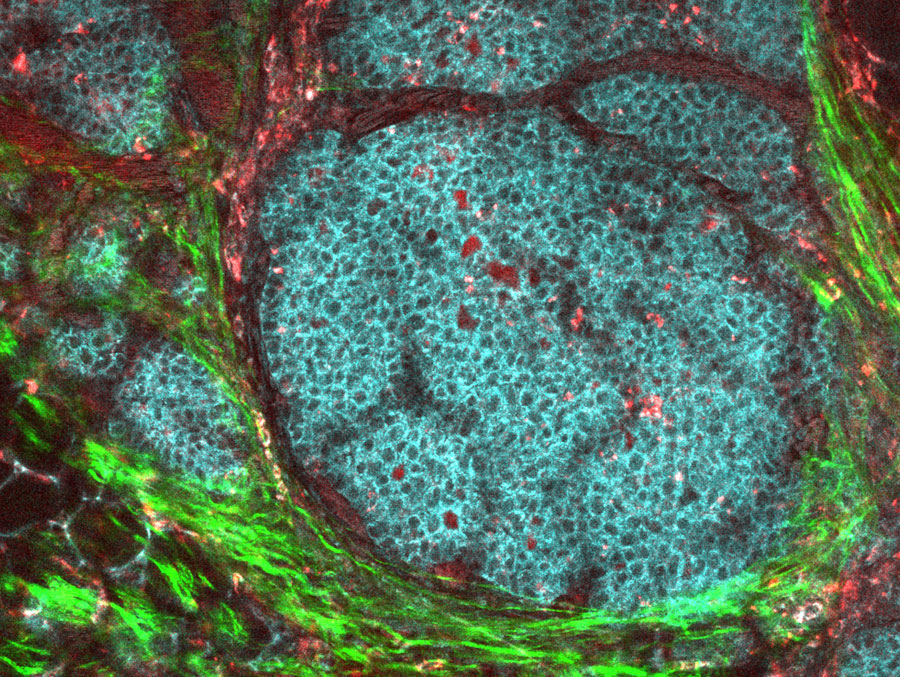
FDA Approves Ribociclib, Expands Palbociclib Approval for Metastatic Breast Cancer
April 10, 2017, by NCI Staff
The Food and Drug Administration (FDA) has approved a new targeted therapy, ribociclib (Kisqali®), and expanded its earlier approval of palbociclib (Ibrance®), for the initial treatment of some women with breast cancer. Both drugs are approved in combination with an aromatase inhibitor for the treatment of postmenopausal women with advanced or metastatic breast cancer that is hormone receptor (HR) positive and HER2 negative.
In 2015, palbociclib was granted accelerated approval based on evidence from a phase II clinical trial. The FDA grants accelerated approvals based on preliminary evidence showing that a new therapy addresses an unmet clinical need. For the FDA to give the therapy traditional approval, however, it requires more in-depth studies to confirm the clinical benefit. Palbociclib now has a regular approval based on positive results from a large phase III trial.
These approvals are likely to affect many patients with metastatic breast cancer, said Stanley Lipkowitz, M.D., Ph.D., chief of the Women’s Malignancies Branch of NCI’s Center for Cancer Research. "The vast majority of patients with metastatic breast cancer are HR positive, HER2 negative," he explained.
Both ribociclib and palbociclib work by inhibiting molecules that help control cell division called cyclin-dependent kinase (CDK) 4 and 6. These enzymes are commonly found in higher than normal amounts in breast cancer cells.
This class of drugs has had a tremendous impact on the length of time that advanced or metastatic breast cancer is controlled, Dr. Lipkowitz stressed.
"A CDK4/6 inhibitor combined with an aromatase inhibitor should probably be the standard first-line treatment for patients with advanced or metastatic breast cancer," he said.
Clinical Findings
The approval of ribociclib was based on interim results from a phase III trial of 668 postmenopausal women with HR-positive, HER2-negative advanced or metastatic breast cancer who had not received prior treatment for advanced cancer. The participants were randomly assigned to receive ribociclib plus the aromatase inhibitor letrozole (Femara®) or placebo plus letrozole. The trial was funded by Novartis, the manufacturer of ribociclib.
After 18 months of follow-up, the progression-free survival rate was 63% for the ribociclib group and 42% for the placebo group. The median time to disease progression was about 15 months in the placebo group and was not yet reached in the ribociclib group by the time of analysis. Approximately 53% of patients in the ribociclib group and 37% of those in the placebo group responded—that is, they had measurable tumor shrinkage after treatment.
The most common adverse events for patients in the ribociclib group were neutropenia, nausea, and infections. Significantly more patients in the ribociclib group than the placebo group had neutropenia or leukopenia—a side effect of CDK4/6 inhibition in blood cells.
The majority of serious adverse events experienced by patients in the ribociclib group were reversed by ribociclib dose reductions or interruptions, the study authors noted.
The expanded approval of palbociclib was based on a phase III trial (called PALOMA-2) of 666 women with HR-positive, HER2-negative breast cancer who were randomly assigned to receive palbociclib plus letrozole or placebo plus letrozole. Compared with placebo, palbociclib extended median progression-free survival by about 10 months, from 15 months in the placebo group to 25 months in the palbociclib group. About 55% of patients in the palbociclib group and 44% in the placebo group had measurable tumor shrinkage after treatment.
At the time of the analyses, the length of patient follow-up in both ribociclib and palbociclib trials was not long enough to determine whether the therapies improved how long patients live. Investigators from both studies are continuing follow-up and expect to report on overall survival in the future.
In combination with letrozole, both ribociclib and palbociclib had similar benefit and side effect profiles, said Dr. Lipkowitz. A direct comparison of the two drugs would require a separate study, he noted.
The bottom line, he continued, is that a CDK4/6 inhibitor—either ribociclib or palbociclib—may be used as first-line therapy for women with HR-positive, HER2-negative advanced or metastatic breast cancer.



































No hay comentarios:
Publicar un comentario